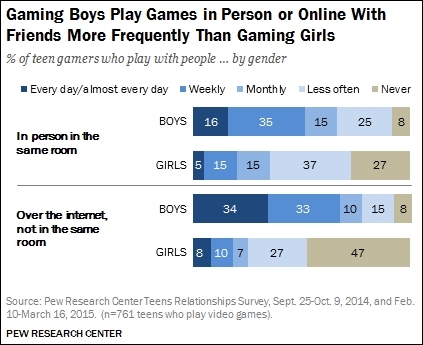-
Tips for becoming a good boxer - November 6, 2020
-
7 expert tips for making your hens night a memorable one - November 6, 2020
-
5 reasons to host your Christmas party on a cruise boat - November 6, 2020
-
What to do when you’re charged with a crime - November 6, 2020
-
Should you get one or multiple dogs? Here’s all you need to know - November 3, 2020
-
A Guide: How to Build Your Very Own Magic Mirror - February 14, 2019
-
Our Top Inspirational Baseball Stars - November 24, 2018
-
Five Tech Tools That Will Help You Turn Your Blog into a Business - November 24, 2018
-
How to Indulge on Vacation without Expanding Your Waist - November 9, 2018
-
5 Strategies for Businesses to Appeal to Today’s Increasingly Mobile-Crazed Customers - November 9, 2018
US teens tune into online friendships
According to a Pew Research Center Study published Thursday, technology is at the center of most teen friendships, with texting reigning as the top daily communication tool. Girls are more likely to make a friend through social media, while boys play games online to meet someone new. The vast majority of teens – 95 percent – still spend time in person with their friends outside of school, and 85 percent say they talk with friends over the phone.
Advertisement
But don’t let these statistics fool you into thinking that teens have no in-person social lives.
The study, Teens, Technology and Friendships involved interviews with just over 1,000 teens between 13 and 17 between September 2014 and February 2015. Fully 68% of social-media-using teens say they have experienced drama among friends on the platform. Pew also found that older teens are more likely to use the web to meet new people versus younger teens.
However, only 20 percent of online teens have met online friends in-person.
“Certainly texting is a more dominant way of communicating, but the phone call is important when they want support”, Lenhart said.
57 percent of teens have made friends online, with 29 percent saying they have made more than five. Fifty-nine percent reported video chatting with their friends, and among boys especially, playing games with friends online (talking all the while) was a powerful way to bond with friends or meet new ones. They found most friendships that are made online, stay online.
But social media has a dark side. As for girls, 78 percent who made a friend online met on a social media site like Facebook or Instagram. And 40 percent of respondents said they feel pressure to post only content that makes them look good to others. This is admittedly anecdotal, but my kids are in much more frequent contact with their far-flung network of childhood friends than I was at their age. Some 26 percent of all teens have had a conflict with a friend over something that happened online or via text.
The Internet is not only being used to create new friendships, but also to strengthen current ones.
The survey wasn’t all good news. There have been a number of studies on how the fear of missing out – where users get anxiety when not checking social media or when they see friends posting about a gathering that doesn’t include them – can cause depression among users, even adults.
Advertisement
We’re all guilty of sharing our Netflix or HBOGo passwords with our romantic partners and/or our besties. Most (88 percent) teenage social media users believe that people share too much information about themselves on social media with 42 percent saying they have had someone post things on social media about them that they can not change or control.




























